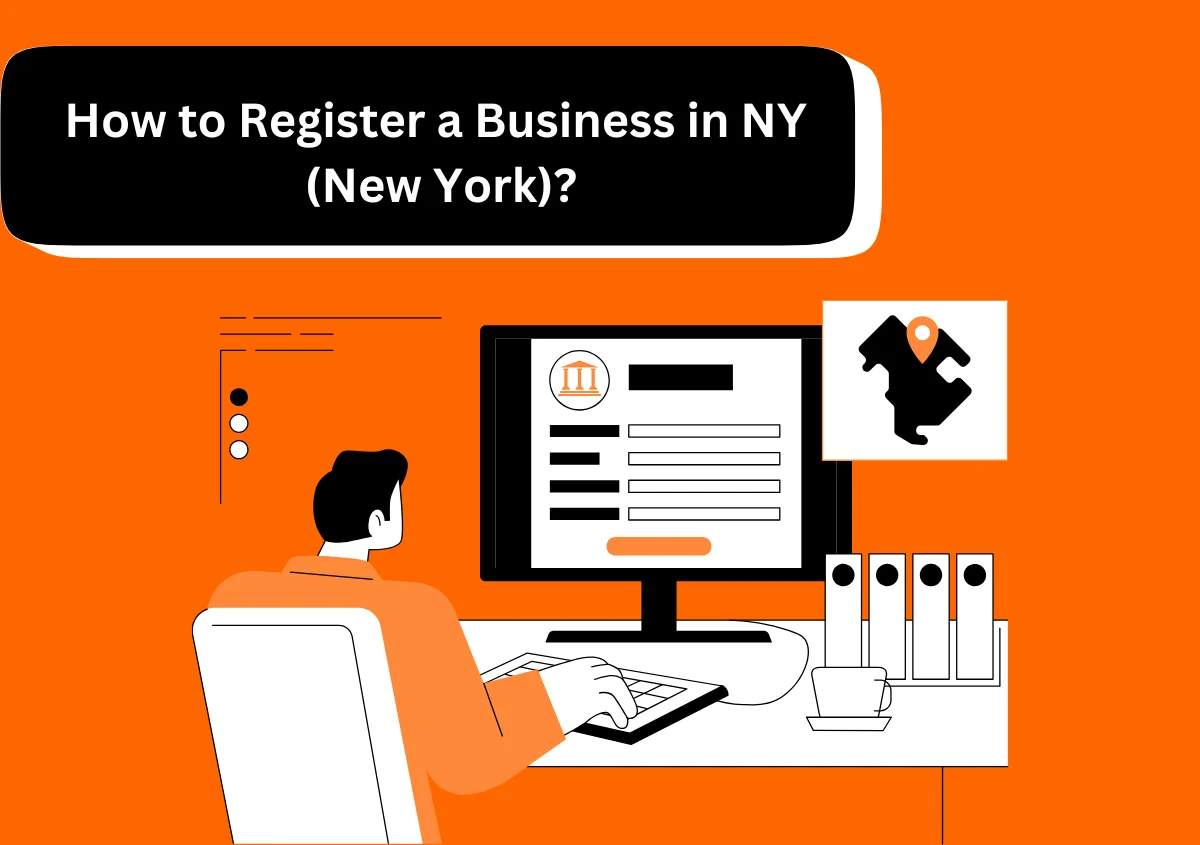You might have a business idea and be eager to start your own business. If you are in New York and plan to start your own business, the first step is registering it. Registering your business with the NYS Department of State is a must in case you opt to incorporate your business or form an LLC.
In this post, we outline all the steps involved in doing so.
Must Read: How to Promote Your Business Locally?
1. Determine the Business Structure
In New York, your business can be run as a sole proprietorship, LLC (limited liability company), partnership, or corporation. All these structures have varied tax implications.
- In a sole proprietorship, you are obligated to file your business income on your personal tax return and to pay self-employment taxes.
- A partnership involves two or more persons engaged in a business.
- In such a business organization, you are not personally responsible for the debts of your business. The corporation is identified as a separate legal entity that has its own federal income taxes.
- In an LLC, you get the limited liability of a corporation. Nonetheless, you can benefit from pass-through taxation by electing to be treated as a partnership. Thus, you do not have to pay corporate taxes.
2. Choose a Business Name

Choosing a business name is an important part of developing a brand identity. Here’s some more detailed advice to help you along:
Guidelines for Selecting a Name
If you are choosing a business name, consider these guidelines so that it will be accurate legally and in terms of branding:
Here are some tips that can help you select the perfect name for your company or a product:
- Unique and Memorable: A good name is distinctly unique, makes people turn their heads, and catches their attention; It also should reflect your business mission or services.
- Compliant with New York Regulations: The name cannot contain any of the prohibited words or phrases nor can it mislead the public as to what type of business it is. For instance, some professional terms require licenses or permits.
- Reflective of Your Business Entity: The name has to conform to the naming requirements for the type of entity chosen. For example, corporations include “Inc.” as part of the name while LLCs must have “LLC” or “Limited Liability Company”, respectively, in the name.
- Scalability: A good name will stay applicable as your business scales or diversifies.
Checking Name Availability
Check name availability before you settle on a business name to avoid legal issues and ensure compliance. The following resources will help you check your business name’s availability.
1. New York Department of State Database
The New York Department of State maintains a public database of registered business names. Use the Business Entity Search Tool to:
- Confirm the name isn’t already in use.
- Verify that it isn’t deceptively similar to another registered name.
- Check compliance with New York state naming requirements.
2. Federal Trademark Database
If you plan to operate nationally or want strong brand protection, check the United States Patent and Trademark Office (USPTO) database. This ensures your chosen name or a similar name hasn’t been trademarked. Visit the Trademark Electronic Search System (TESS) for this search.
Reserving a Business Name (If Applicable)
If you’re not ready to file your business formation documents but want to secure a name, you can reserve it. Here’s how:
- File a Name Reservation Application: Submit a form to the New York Department of State along with a reservation fee (currently $20).
- Validity Period: A reserved name is held for 60 days, with the option to renew once for an additional 60 days.
- When to Reserve: This is especially helpful if you need time to finalize other aspects of your business before officially registering it.
3. Register the Business Entity
Registering your business entity is a crucial legal step in starting a business in New York. The process and requirements vary based on your chosen business structure. Here’s a breakdown:
Sole Proprietors and Partnerships: Filing a Business Certificate (DBA)
- What to File: Sole proprietors and general partnerships operating under a name other than their legal name must file a Business Certificate, also known as a Doing Business As (DBA) certificate.
- Where to File: Submit the DBA with the County Clerk’s Office in the county where the business operates.
- Required Information: Include the business name, owner(s) name(s), and business address.
- Filing Fee: Fees vary by county but typically range from $25 to $50.
LLCs: Filing Articles of Organization
- What to File: LLCs must file Articles of Organization (Form DOS-1336) with the New York Department of State.
- Steps to Complete:
- Include the LLC’s name, purpose, county of operation, registered agent, and address for service of process.
- Choose a registered agent or use the Secretary of State by default.
- Publication Requirement: New York requires LLCs to publish a notice of formation in two local newspapers for six consecutive weeks.
- Filing Fee: The fee is $200, and additional publication costs vary by county.
- Processing Time: Typically takes 7–10 business days or expedited services are available for an additional fee.
Corporations: Filing a Certificate of Incorporation
- What to File: Corporations must file a Certificate of Incorporation (Form DOS-1239) with the New York Department of State.
- Steps to Complete:
- Include the corporation’s name, purpose, number of shares, registered agent, and address for service of process.
- Designate a board of directors and draft bylaws to guide operations.
- Filing Fee: The fee is $125, plus an additional $10 for each stock share up to 200, or $25 for more than 200 shares.
- Processing Time: Typically processed in 7–10 business days, with expedited services available.
Nonprofits: Filing a Certificate of Incorporation for Nonprofit
- What to File: Nonprofits must file a Certificate of Incorporation (Form DOS-1511) tailored for charitable or non-charitable purposes.
- Steps to Complete:
- Include the nonprofit’s name, purpose, registered agent, and address for service of process.
- Specify whether the nonprofit will seek tax-exempt status under IRS Section 501(c)(3).
- Draft bylaws to outline operational policies.
- Filing Fee: The fee is $75.
- Processing Time: Typically takes 7–10 business days.
Filing Fees and Timeline
- Fees Summary:
- Sole Proprietors/Partnerships: $25–$50 (varies by county).
- LLCs: $200 (plus publication costs).
- Corporations: $125 (plus share-based fees).
- Nonprofits: $75.
- Processing Timeline: Standard processing is generally 7–10 business days. Expedited services are available for an additional fee, which can reduce processing time to 24–48 hours.
4. Obtain an Employer Identification Number (EIN)
As a business owner, you’ll need an EIN for several things. These include opening a business bank account, applying for business licenses, and filing your tax returns.
Apply for EIN by going to https://sa.www4.irs.gov/modiein/individual/index.jsp. The application is free. You just need to answer a few basic questions regarding your business. EIN is issued immediately after you answer these questions.
5. Register for State and Local Taxes
This part involves setting up an NY.gov account and registering for taxes through the New York Business Express. All the steps are explained below.
a. Create an NY.gov Account
An NY.gov account is needed if you want to register your business and manage your licenses or permits online.
Go to https://my.ny.gov/ to set up your account. Answer “BUSINESS” as the account type. Fill out the application to complete the account setup.
b. Register Your Business for Taxes Through the New York Business Express
Users with an NY.gov business account get access to the New York Business Express. You can use it to register your business for taxes.
Go to the Business Express and tap “Get Started.” This will give you access to the Business Wizard. Answer a few questions about your business. The Business Wizard will tell you what you need to register and the licenses or permits you need.
c. Get a Certificate of Authority to Collect Sales Taxes
If you sell taxable goods/services, you’ll have to collect state and local sales taxes from your customers. For this, you need a certificate of authority. Apply for this certificate at least 20 days before you sell taxable goods or services.
To apply, go to https://www.businessexpress.ny.gov/app/answers/cms/a_id/2058/kw/certificate%20of%20authority/. There is no fee required to apply for the certificate. The approval process takes around 5 days.
6. Acquire Necessary Permits and Licenses
Licenses cover different domains. These might be health and safety, environment compliance, building and construction regulations, etc.
New York State Business Express lists all of the licenses the state gives out. Use the state’s online
Business Wizard where you can input your business details to receive an optimized list of licenses and permits required.
Local authorities might impose licensing requirements of their own.
Plus The New York Department of State (DOS) website for state-licensed occupations and professions. Keeping with these protocols and getting the licenses and permits is the law of the land.
7. Open a Business Bank Account

Your business needs to be separate from your personal financial situation in order to keep the protections that are obtained by registering your business. That is done by opening a business bank account.
You have to provide an EIN to open this account. We have talked about obtaining EIN in the 4th step. If you have opened a business bank account, deposit funds in it. You can deposit cash, a check, or wire funds, or with any other deposit form.
8. Fulfill Employer Responsibilities (if Hiring Employees)
To fulfill employer responsibilities when hiring employees, you must address the following key areas:
1. Workers’ Compensation Insurance
Employers are generally required to carry workers’ compensation insurance to cover medical expenses and lost wages for employees injured on the job. The exact requirements vary by state, so it’s essential to ensure compliance with local regulations.
2. Unemployment Insurance
Employers are mandated to pay unemployment taxes to state and federal programs. These safeguard employees who lose their jobs for reasons outside of their control. Registering with your state’s unemployment agency is usually required to fulfill this responsibility.
3. Compliance with Labor Laws
Employers must adhere to federal, state, and local labor laws. This includes:
- Fair Labor Standards Act (FLSA): Ensuring compliance with minimum wage, overtime, and recordkeeping adherements.
- Occupational Safety and Health Administration (OSHA): Providing a safe and healthy work environment.
- Equal Employment Opportunity (EEO): Preventing discrimination and harassment in hiring and other workplace activities.
- Family and Medical Leave Act (FMLA): Allowing eligible employees to take unpaid, job-protected leave for needed reasons.
Steps to Ensure Compliance:
- Register Your Business: Obtain an Employer Identification Number (EIN) from the IRS.
- Set Up Payroll Systems: Withhold and pay needed taxes, including Social Security and Medicare.
- Post Required Notices: Display workplace posters mandated by labor laws.
- Maintain Accurate Records: Keep detailed records of employee hours, wages, and benefits.
- Stay Informed: Regularly review updates to labor laws and regulations.
9. Publish a Legal Notice (LLCs Only)

For LLCs in New York, the publication requirement involves specific steps:
- New York LLC Publication Requirement: New LLCs must publish a notice of formation in one daily and one weekly approved newspaper designated by the county clerk where the LLC is situated. The notice must run for six consecutive weeks.
- Choosing an Approved Newspaper: After forming the LLC, contact the county clerk’s office to obtain a list of approved newspapers. Select two and coordinate the publication with their respective offices.
- Filing Proof of Publication: After the publication period, the newspapers will provide affidavits of publication. Submit these, along with a Certificate of Publication, to the New York Department of State. Then, pay the needed filing fee.
10. Protect Your Business
- Trademarking Your Business Name or Logo: To safeguard your brand identity, register your business name or logo with the U.S. Patent and Trademark Office (USPTO). This ensures undivided rights to use your brand in relation to your offerings.
- Get Business Insurance: Protect your business against potential risks with insurance, such as:
- General Liability Insurance: Covers bodily injury, property impairment, and related claims.
- Professional Liability Insurance: Protects against claims of negligence, errors, or omissions in your services.
- Property Insurance: Covers physical assets like equipment and office space.
11. Understand Ongoing Compliance Requirements
To maintain your business in good standing, meet these ongoing obligations:
- Annual Report Filing: Submit an annual report to the New York Department of State. It should have the latest data related to your business address, members, or managers. Pay the needed fee.
- Paying Business Taxes: Stay current on federal, state, and local taxes. This includes income tax, sales tax (if applicable), and payroll taxes for hires.
- Renewing Licenses and Permits: Check the expiration dates of any required licenses or permits for your industry and renew them promptly.
12. Resources for New York Business Owners
- New York State Department of State (DOS): The official agency for LLC creation, compliance, and business filings. Access forms and processes on their website.
- Small Business Administration (SBA): Provides resources like funding programs, business planning tools, and data on compliance requirements.
- Local Chambers of Commerce: Offer networking opportunities, local business support, and advocacy.
- SCORE Mentorship and Workshops: Access free mentorship and attend workshops tailored to small business owners via SCORE, a nonprofit supported by the SBA.
13. Market Your Business

Marketing is crucial to attract customers and generate sales. Once you are done setting up your venture, it’s time to promote it. Here are some effective strategies.
Create a Business Website
A business website acts as an online storefront. Your site must be desktop and mobile-friendly and easy to navigate. Fill it with high-quality images of your products/services and relevant content so your target audience can find it in the search engine. Consider contacting a web development agency to build a professional website for your company.
Use Social Media and Online Directories
Social media channels are dynamic tools for marketing your business offerings. Create profiles on popular channels, such as Instagram, Twitter, and Facebook. Talk about your services to your target audience in these places. Listing your business in online directories like Yelp and Google My Business will help you get found by local customers.
Optimize Your Website’s SEO
Search engine optimization (SEO) enables your business website to rank higher in SERPs. So, develop your site for SEO by including relevant keywords in your site’s content. SEO involves much more than using keywords. You can consider hiring a professional SEO agency to optimize your site. An agency’s professionals are well-versed in SEO principles. They create effective strategies to help you reach your target audience.
Run a Google Ads (PPC) Campaign
Google Ads is a digital ad model. Here the advertiser pays each time a user taps on their ads. This pulls traffic to the website. Advertisers place a bid to set the maximum price they can pay for a searcher to tap on an ad. By using relevant keywords, location parameters, and a tailored ad copy, you can create targeted ad campaigns. You can also reach out to a New York PPC agency for help with your business’s PPC campaigns.
Set Up Google Local Services Ads
Google Local Services Ads are useful for certain businesses, such as locksmiths, plumbers, and electricians, among others. These ads appear above the traditional paid ads. They showcase all relevant business information. This includes active hours, services, etc. Google local service ads can run on both mobile and desktops.
Summing Up
Registering a business in New York involves multiple steps, which need to be undertaken with careful planning and attention to detail. By following the steps outlined in this post, you can establish a strong foundation for your new endeavor. Remember to market your business online and offline (if applicable) to maximize your reach and achieve success. Connect with a digital marketing agency to expand your business’s online visibility and drive more leads and sales.






